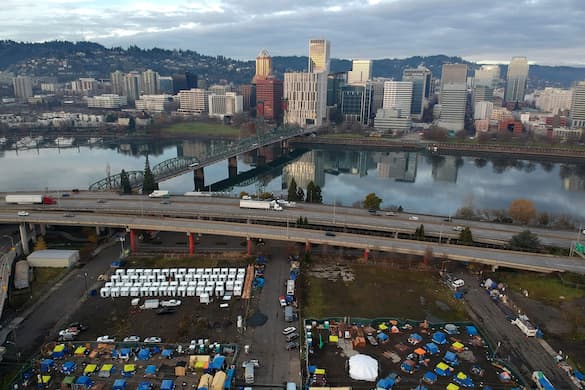‘Life Is Pretty Miserable’: Portland Residents Say New Homeless ‘Safe Rest Village’ Exposes Them to Thievery, Drug Dealing, Filth
‘I’ve called the cops. The cops don’t do anything, right? What can they do?’ says a resident who charges people are selling drugs outside her home in the middle of the day.

Neighbors at North Portland are fearful and frustrated upon the opening of a homeless camp along the Oregon city’s Peninsula Crossing Trail.
The so-called Safe Rest Village opened last month after authorities swept out a number of crime-ridden homeless encampments along the trail. Yet, residents in the neighborhood say they are now witnessing robbery of their properties, street fights, and people doing drugs close to their houses.
“Life is pretty miserable because we live in a kind of anxiety,” a neighbor who has lived at University Park for 42 years, George Siebert, told KATU 2 news. He now lives 14 feet away from the camp’s bathrooms. He claims he can hear people going to the toilet all day and the washers and dryers spinning late at night.
Portland has been in the grips of a homelessness crisis in recent years. The Safe Rest Village is one of many efforts at accommodation as Portland now tries to crack down on the encampments in the face of ballooning opposition from homeowners and renters.
One neighbor who lives close to the Safe Rest Village, Chrisanne Boles, told KATU 2 that she has seen people sell drugs outside her home in the middle of the day. She also claims they have stolen things out of her yard.
“The ones that are really homeless and not doing drugs, I have compassion for them,” Ms. Boles said. “These ones right here, I have no compassion. They’re not trying to help themselves. I’ve called the cops. The cops don’t do anything, right? What can they do?”
The village is operated by a nonprofit organization, Urban Alchemy, which partnered with the local government to run six rest villages across the city. It received $50 million from Portland to operate the sites. Regarding the staffers who work at the shelter, Urban Alchemy says most are found through local parole offices, as it wants to hire people who were formerly incarcerated or homeless to give them a second chance.
“What we’ve generally found is that people with those kinds of experiences are able to support the homeless communities in ways that others might not be able to,” the director of Urban Alchemy operations at Portland, Jeffers Dickey, said at the inauguration of the shelter.
The shelter is providing “life-saving housing and services” to 68 people who were on the street a week ago, the chief of community and government affairs for Urban Alchemy, Kirkpatrick Tyler, tells the Sun in a statement sent through a representative. In addition, he said they are taking steps to add two or more practitioners per shift to monitor the areas surrounding the shelter to determine illicit activity and provide safety.
“Prior to moving into this Safe Rest Village, the residents had all been encamped together along the PCT adjacent to the site,” Mr. Tyler said. “Large encampments aren’t just groups of tents — they’re highly vulnerable and entrenched communities that can become hubs for unsafe and illegal activity.”
The 14,600-square-foot shelter has a capacity of 60 sleeping units and includes amenities such as air conditioning and heat, a laundry room, bathrooms with toilets and showers, and offices for the staff. The site will also include a dog park. According to Portland’s government, the village will have a seven-foot privacy fence around the perimeter of the site.
The site was inaugurated on May 18 this year. The press and neighbors were invited inside the village by Commissioner Dan Ryan, who oversees the safe rest villages in Portland. “This humanitarian crisis has been very uncomfortable for a lot of people,” Mr. Ryan said. “I think that today there’s hope.”
Oregon’s homeless population has increased by 22.5 percent between 2020 and 2022, according to data from the U.S. Department of Housing and Urban Development.
To manage the homeless situation, the Portland City Council this month voted to ban camping on public property between 8 a.m. and 8 p.m. and to limit camping spots for the night. Homeless individuals will be required to pack their shelters every morning. If they fail to do so more than three times, they could face a fine of up to $100 or be imprisoned for up to 30 days. The law will go into effect on July 1.

